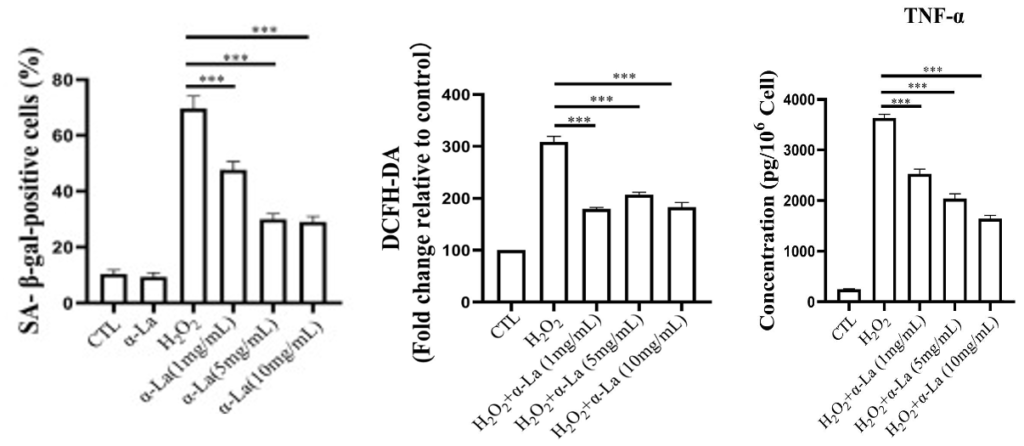Whey Protein Shown to Reduce Cardiac Scarring and Blood Vessel Thickness
Chinese scientists show that ɑ-lactalbumin, a protein found in milk, can protect against heart scarring and blood vessel thickening in elderly mice by ameliorating inflammation.
Highlights:
- A whey protein found in milk, ɑ-lactalbumin, was shown to decrease age-related changes in heart cells after experimentally-induced senescence (a state of cellular stasis associated with aging).
- Lactalbumin decreased DNA damage, cellular stress, and inflammation in artificially-aged cardiovascular cells.
- Treatment with lactalbumin also reduced inflammation and cardiac scarring in the hearts of aged mice while reducing blood vessel thickness.
Increasing our heart health is an important component of increasing our health span – our years living healthy lives. A recent study found that a whey protein found in cow’s milk (and breastmilk) may actually be able to help prevent age-related declines in cardiovascular health.
The study out of China was published in International Immunopharmacology and focused on human cardiovascular cells grown in Petri dishes and from mice that model aging. When human coronary artery cells with induced senescence were exposed to lactalbumin, the cells had decreased senescence, DNA damage, inflammation, and cellular stress. Similar effects were seen in the hearts of aged mice when the mice were given lactalbumin. Furthermore, lactalbumin treatment reduced inflammation and blood vessel thickness in the aged mice.
“We…found that α-lactalbumin has good anti-aging potential… suggesting that α-lactalbumin could be used as an antiaging functional food in the future,” the scientists wrote.
Whey Protein Protects the Cardiovascular System from Aging
The scientists exposed human coronary artery endothelial cells (HCAECs) – the cells lining the blood vessels that supply the heart with blood – as well as cardiomyocytes (the muscle cells of the heart) to hydrogen peroxide to induce senescence. Subsequent treatment with lactalbumin decreased senescence and markers of DNA damage while increasing cell survival. Furthermore, oxidative stress – cellular stress caused by reactive molecules – and inflammation were also reduced following lactalbumin treatment.

Senescence and inflammation, along with increased blood vessel thickness and fibrosis (scarring), are signs of cardiovascular aging, which can ultimately lead to heart failure. Zhang and colleagues looked at how lactalbumin affects cardiovascular aging by assessing these features in aged mice.
20-month-old mice (approximately 65 human years) given either a low (50 milligram/kilogram (mg/kg)), medium (100 mg/kg), or high (200 mg/kg) dose of lactalbumin showed decreased cardiovascular cell senescence and tissue fibrosis. Similar to the cell studies, inflammation and oxidative stress were also decreased. Furthermore, the blood vessels of the treated mice had decreased thickness, indicative of healthier blood vessels.

Whey Protein for Better Cardiovascular Health
Zhang and colleagues show that ɑ-lactalbumin from milk could help protect our hearts as we age. They bring forth arguments in its favor, including its stability, safety, and ability to be consumed in large quantities daily. Furthermore, previous studies have found that ɑ-lactalbumin could inhibit colon inflammation, and another protein in milk, lactoferrin, has also shown anti-fibrotic effects.
However, other studies have shown that dairy products, including milk, may have adverse effects on the cardiovascular system due to their high animal fat content. More research and clinical trials are needed before toting ɑ-lactalbumin treatments (or just consuming more milk) as a way to stave off cardiovascular aging.
Model: C57 mice
Dosage: oral ɑ-lactalbumin ranging from 50 to 200 mg/kg

